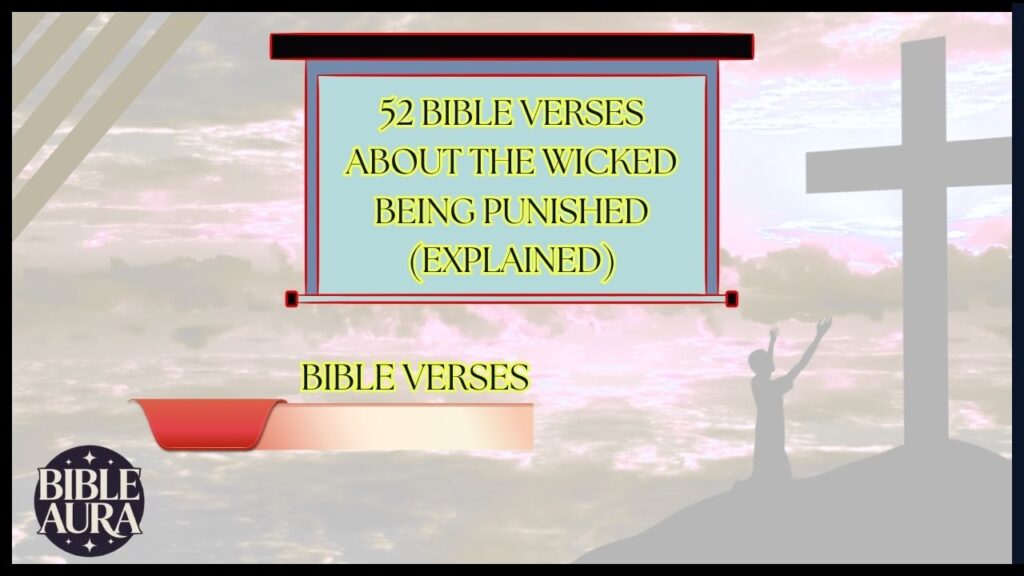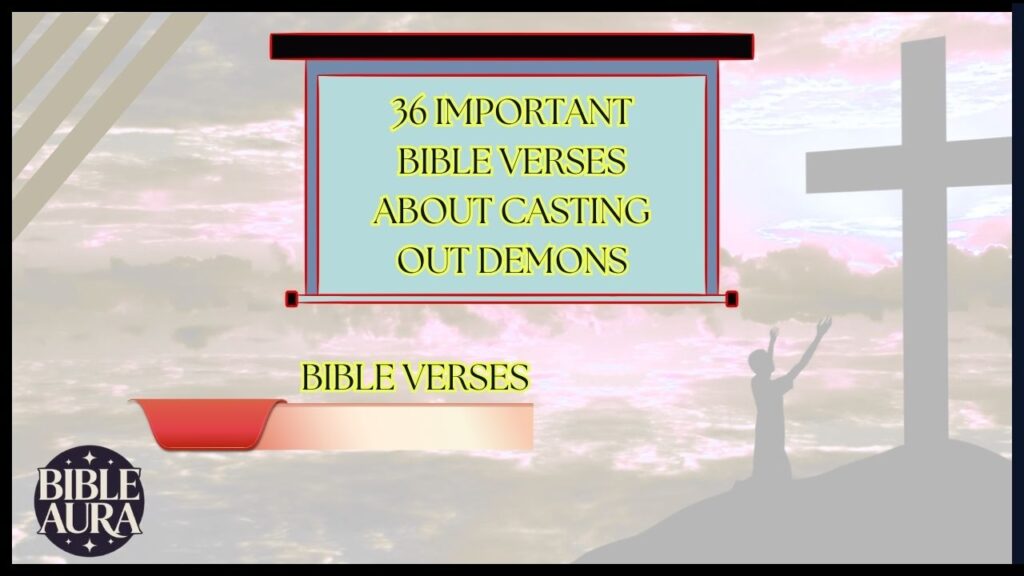Bible Verses About the Wicked Being Punished: Throughout scripture, God’s justice is a prominent theme that offers both warning and comfort. When evil seems to prosper in our world, many believers struggle with questions about fairness and divine intervention. These passages remind us that wickedness will not go unaddressed forever.
The Bible consistently teaches that God is both merciful and just. While He extends patience and opportunity for repentance, there will ultimately be accountability for those who persist in evil. Understanding these verses helps us maintain perspective when injustice appears to triumph.
These scriptures aren’t meant to foster a spirit of vengeance but rather to reassure us that God sees all things and will ultimately establish perfect justice. They remind us to trust in His timing and righteous judgment rather than taking matters into our own hands.
Also Read: 40 Amazing Bible Verses About Sunsets
Divine Justice: God’s Guarantee of Accountability
Psalm 37:1-2
“Do not fret because of those who are evil or be envious of those who do wrong; for like the grass they will soon wither, like green plants they will soon die away.”
This passage addresses the common frustration of seeing wicked people prosper temporarily. It reminds us that their success is fleeting, like vegetation that quickly withers. When you feel discouraged by the apparent success of wrongdoers, remember that God sees beyond present circumstances to the ultimate outcome.
Proverbs 11:21
“Be sure of this: The wicked will not go unpunished, but those who are righteous will go free.”
This proverb offers a straightforward promise that wickedness faces consequences while righteousness brings deliverance. Apply this wisdom by maintaining integrity even when dishonesty might seem advantageous, trusting that God’s justice will prevail in the end.
Isaiah 13:11
“I will punish the world for its evil, the wicked for their sins. I will put an end to the arrogance of the haughty and will humble the pride of the ruthless.”
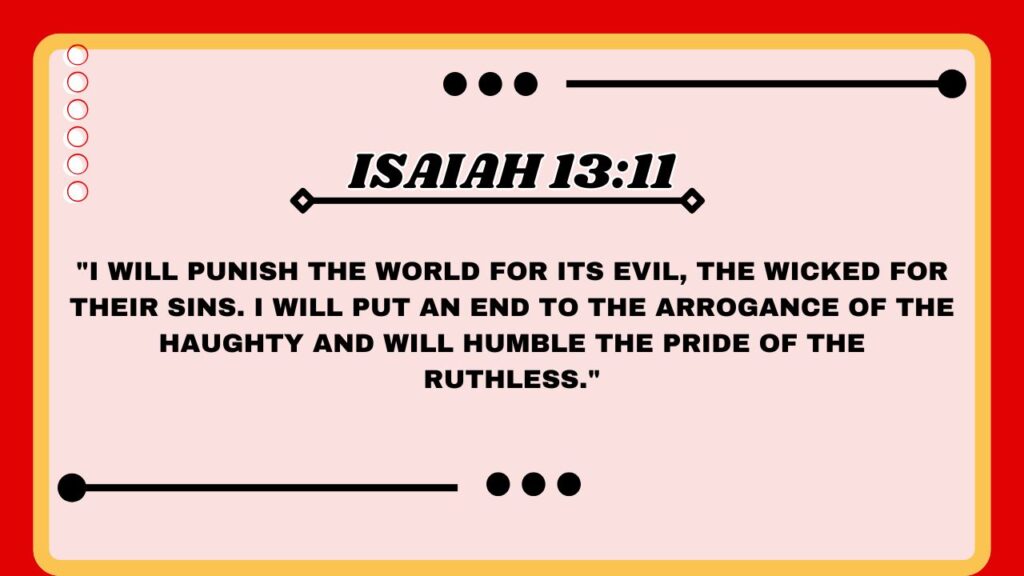
Isaiah prophesies God’s response to pervasive evil, particularly addressing pride and ruthlessness. This verse reminds us that God actively opposes those who harm others through arrogance and cruelty. Consider how this might challenge your own attitudes and actions toward others.
Romans 12:19
“Do not take revenge, my dear friends, but leave room for God’s wrath, for it is written: ‘It is mine to avenge; I will repay,’ says the Lord.”
Paul instructs believers to resist the temptation to seek personal vengeance, instead trusting God’s perfect judgment. This verse frees us from the burden of settling scores ourselves. When wronged, release your right to retaliation and trust God to address injustice in His perfect timing.
Nahum 1:3
“The Lord is slow to anger but great in power; the Lord will not leave the guilty unpunished. His way is in the whirlwind and the storm, and clouds are the dust of his feet.”
Nahum balances God’s patience with His commitment to justice. This verse reveals that God’s restraint is not weakness but part of His character. Remember that God’s timing differs from ours, but His justice is certain and complete when it arrives.
Also Read: 55 Important Bible Verses About Sports
Temporal Consequences: Earthly Results of Wickedness
Proverbs 10:7
“The name of the righteous is used in blessings, but the name of the wicked will rot.”
Solomon observes how reputation endures beyond life the righteous are remembered fondly while the wicked are forgotten or reviled. This reminds us that legacy matters. Consider what kind of memory you’re creating through your daily choices and how your life will impact future generations.
Psalm 73:18-19
“Surely you place them on slippery ground; you cast them down to ruin. How suddenly are they destroyed, completely swept away by terrors!”
The psalmist describes the precarious position of those who reject God’s ways. Despite appearances, their foundation is unstable. This passage helps recalibrate our perspective when evil seems to prosper. Remember that what appears secure apart from God’s principles ultimately lacks stability.
Proverbs 29:16
“When the wicked thrive, so does sin, but the righteous will see their downfall.”
This proverb connects societal corruption with leadership that embraces wickedness. It promises that righteous people will witness justice eventually. Apply this by remaining faithful in corrupt environments, knowing that God’s justice will ultimately be visible to those who remain true to Him.
Ecclesiastes 8:13
“Yet because the wicked do not fear God, it will not go well with them, and their days will not lengthen like a shadow.”
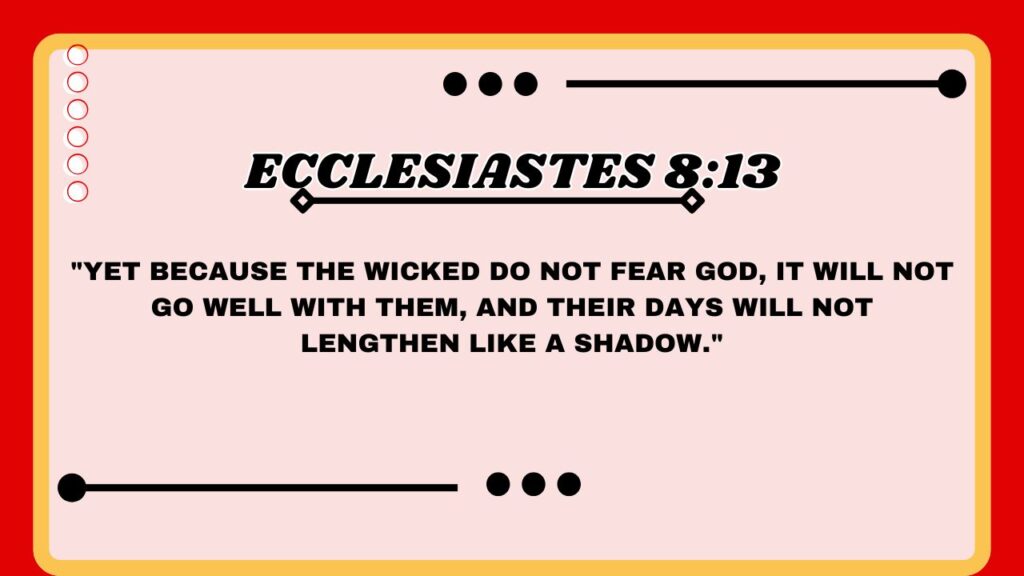
The Teacher explains that rejecting reverence for God leads to negative outcomes. This verse suggests that wickedness contains its own punishment. Cultivate proper fear of God as the foundation for wisdom, recognizing that alignment with His design leads to flourishing.
Proverbs 21:7
“The violence of the wicked will drag them away, for they refuse to do what is right.”
Solomon describes how violent people become ensnared by their own destructive behaviors. This verse reveals the self-defeating nature of wickedness. Observe how this principle operates in society, where those who embrace violence often become its victims.
Eternal Judgment: The Ultimate Reckoning
2 Thessalonians 1:6-9
“God is just: He will pay back trouble to those who trouble you and give relief to you who are troubled, and to us as well. This will happen when the Lord Jesus is revealed from heaven in blazing fire with his powerful angels. He will punish those who do not know God and do not obey the gospel of our Lord Jesus. They will be punished with everlasting destruction and shut out from the presence of the Lord and from the glory of his might.”
Paul assures persecuted believers that God will address injustice when Christ returns. This passage places current suffering in the context of ultimate justice. When facing persecution, draw comfort from knowing that God sees your situation and will bring perfect resolution in His time.
Revelation 20:12-13
“And I saw the dead, great and small, standing before the throne, and books were opened. Another book was opened, which is the book of life. The dead were judged according to what they had done as recorded in the books. The sea gave up the dead that were in it, and death and Hades gave up the dead that were in them, and each person was judged according to what they had done.”
John’s vision depicts the final judgment where everyone faces accountability for their actions. This scene emphasizes that nothing remains hidden from God’s sight. Live with awareness that every action matters and will ultimately be evaluated by a perfectly just God.
Matthew 13:41-42
“The Son of Man will send out his angels, and they will weed out of his kingdom everything that causes sin and all who do evil. They will throw them into the blazing furnace, where there will be weeping and gnashing of teeth.”
Jesus uses agricultural imagery to describe the separation of righteousness from wickedness. This parable portrays the seriousness of judgment awaiting those who persist in evil. Let this sobering picture motivate compassionate witness to those who don’t yet understand the consequences of rejecting God.
Jude 1:14-15
“Enoch, the seventh from Adam, prophesied about them: ‘See, the Lord is coming with thousands upon thousands of his holy ones to judge everyone, and to convict all of them of all the ungodly acts they have committed in their ungodliness, and of all the defiant words ungodly sinners have spoken against him.'”
Jude quotes ancient prophecy about judgment affecting all humanity. This verse emphasizes accountability not just for actions but also for words spoken against God. Remember that seemingly private rebellion doesn’t escape God’s notice, and speak about Him with appropriate reverence.
2 Peter 2:9
“If this is so, then the Lord knows how to rescue the godly from trials and to hold the unrighteous for punishment on the day of judgment.”
Peter contrasts God’s deliverance of the righteous with His restraint of the wicked for judgment. This verse assures believers of both God’s present help and future justice. Trust God’s ability to navigate the complexity of saving some while holding others accountable.
Also Read: 40 Bible Verses About Blooming Where You Are Planted
God’s Patience: The Window of Opportunity
2 Peter 3:9-10
“The Lord is not slow in keeping his promise, as some understand slowness. Instead he is patient with you, not wanting anyone to perish, but everyone to come to repentance. But the day of the Lord will come like a thief. The heavens will disappear with a roar; the elements will be destroyed by fire, and the earth and everything done in it will be laid bare.”
Peter explains that God’s apparent delay in judgment stems from mercy, not indifference. This passage reveals God’s desire for repentance rather than punishment. Allow this understanding of God’s heart to shape your own attitude toward those who have yet to embrace His truth.
Ezekiel 33:11
“Say to them, ‘As surely as I live, declares the Sovereign Lord, I take no pleasure in the death of the wicked, but rather that they turn from their ways and live. Turn! Turn from your evil ways! Why will you die, people of Israel?'”
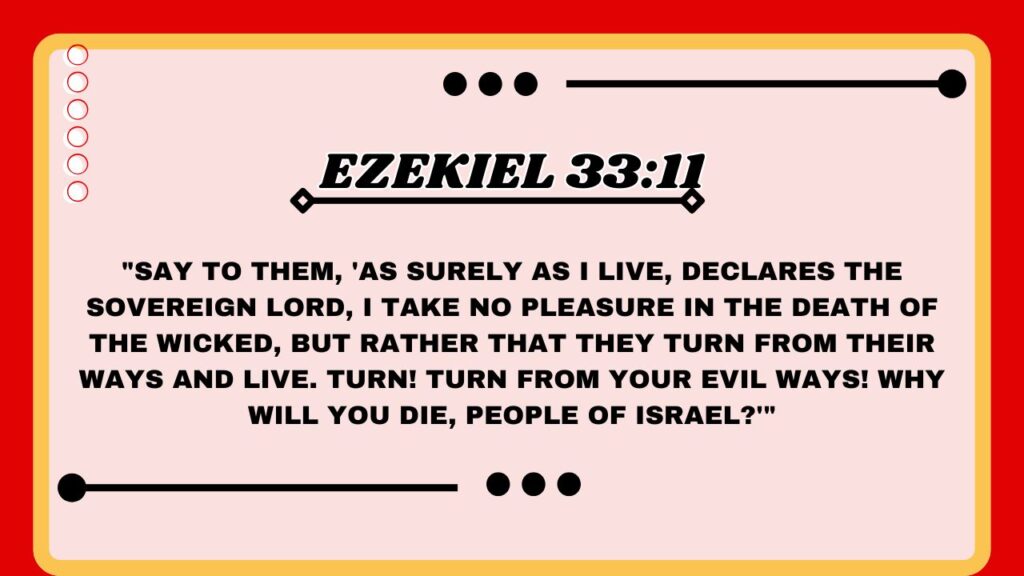
God expresses His preference for repentance over punishment through Ezekiel. This verse reveals God’s heart toward those engaged in wickedness. Mirror God’s attitude by desiring restoration rather than retribution for those who have wronged you or others.
Isaiah 55:7
“Let the wicked forsake their ways and the unrighteous their thoughts. Let them turn to the Lord, and he will have mercy on them, and to our God, for he will freely pardon.”
Isaiah extends God’s invitation to abandon wickedness and receive forgiveness. This verse emphasizes the possibility of transformation through repentance. Remember that God’s judgment aims to correct rather than merely condemn, and extend similar grace to others.
Romans 2:4-5
“Or do you show contempt for the riches of his kindness, forbearance and patience, not realizing that God’s kindness is intended to lead you to repentance? But because of your stubbornness and your unrepentant heart, you are storing up wrath against yourself for the day of God’s wrath, when his righteous judgment will be revealed.”
Paul warns against misinterpreting God’s patience as approval or indifference. This passage clarifies that postponed consequences aim to provide opportunity for change. Recognize God’s kindness in delaying judgment and respond appropriately through repentance.
Luke 13:6-9
“Then he told this parable: ‘A man had a fig tree growing in his vineyard, and he went to look for fruit on it but did not find any. So he said to the man who took care of the vineyard, “For three years now I’ve been coming to look for fruit on this fig tree and haven’t found any. Cut it down! Why should it use up the soil?” “Sir,” the man replied, “leave it alone for one more year, and I’ll dig around it and fertilize it. If it bears fruit next year, fine! If not, then cut it down.”‘”
Jesus illustrates God’s patience through a vineyard owner who extends opportunity to an unproductive tree. This parable shows both the reality of accountability and the extension of grace. Consider whether you’re bearing fruit worthy of the patience God has shown you.
Also Read: 56 Important Bible Verses About Overcoming
Learning from Biblical Examples
Genesis 6:5-7
“The Lord saw how great the wickedness of the human race had become on the earth, and that every inclination of the thoughts of the human heart was only evil all the time. The Lord regretted that he had made human beings on the earth, and his heart was deeply troubled. So the Lord said, ‘I will wipe from the face of the earth the human race I have created and with them the animals, the birds and the creatures that move along the ground for I regret that I have made them.'”
Moses records God’s assessment before the flood, showing divine grief over humanity’s corruption. This passage reveals both God’s emotional response to evil and His decisive action. Consider the seriousness with which God views wickedness and examine your own heart for areas needing transformation.
Genesis 19:24-25
“Then the Lord rained down burning sulfur on Sodom and Gomorrah from the Lord out of the heavens. Thus he overthrew those cities and the entire plain, destroying all those living in the cities and also the vegetation in the land.”
The destruction of Sodom and Gomorrah demonstrates God’s judgment against extreme wickedness. This account serves as a sobering example of divine intervention. While recognizing God’s judgment, remember that He was willing to spare the cities for even a few righteous individuals, showing His desire for mercy.
Exodus 14:26-28
“Then the Lord said to Moses, ‘Stretch out your hand over the sea so that the waters may flow back over the Egyptians and their chariots and horsemen.’ Moses stretched out his hand over the sea, and at daybreak the sea went back to its place. The Egyptians were fleeing toward it, and the Lord swept them into the sea. The water flowed back and covered the chariots and horsemen the entire army of Pharaoh that had followed the Israelites into the sea. Not one of them survived.”
Moses describes the destruction of Pharaoh’s army after repeated refusals to free the Israelites. This event demonstrates God’s power to deliver His people from oppressors. Remember that God sees the suffering of the oppressed and will ultimately hold oppressors accountable.
2 Kings 17:7-8, 18
“All this took place because the Israelites had sinned against the Lord their God, who had brought them up out of Egypt from under the power of Pharaoh king of Egypt. They worshiped other gods and followed the practices of the nations the Lord had driven out before them, as well as the practices that the kings of Israel had introduced… So the Lord was very angry with Israel and removed them from his presence. Only the tribe of Judah was left.”
The historical account of Israel’s exile explains it as consequence for persistent unfaithfulness. This passage shows that even God’s covenant people faced judgment for rebellion. Learn from Israel’s experience by taking God’s warnings seriously and maintaining faithful obedience.
Acts 5:1-11
“Now a man named Ananias, together with his wife Sapphira, also sold a piece of property. With his wife’s full knowledge he kept back part of the money for himself, but brought the rest and put it at the apostles’ feet… Then Peter said, ‘Ananias, how is it that Satan has so filled your heart that you have lied to the Holy Spirit and have kept for yourself some of the money you received for the land?’… When Ananias heard this, he fell down and died… About three hours later his wife came in, not knowing what had happened. Peter asked her, ‘Tell me, is this the price you and Ananias got for the land?’ ‘Yes,’ she said, ‘that is the price.’ Peter said to her, ‘How could you conspire to test the Spirit of the Lord?’… At that moment she fell down at his feet and died.”
Luke records the sudden deaths of Ananias and Sapphira after they lied about their giving. This account demonstrates God’s concern for integrity within the church community. Take seriously the call to truthfulness and integrity, recognizing that God values authenticity over appearances.
Also Read: 53 Bible Verses About Resilience (Explained)
The Relationship Between Sin and Consequences
Galatians 6:7-8
“Do not be deceived: God cannot be mocked. A man reaps what he sows. Whoever sows to please their flesh, from the flesh will reap destruction; whoever sows to please the Spirit, from the Spirit will reap eternal life.”
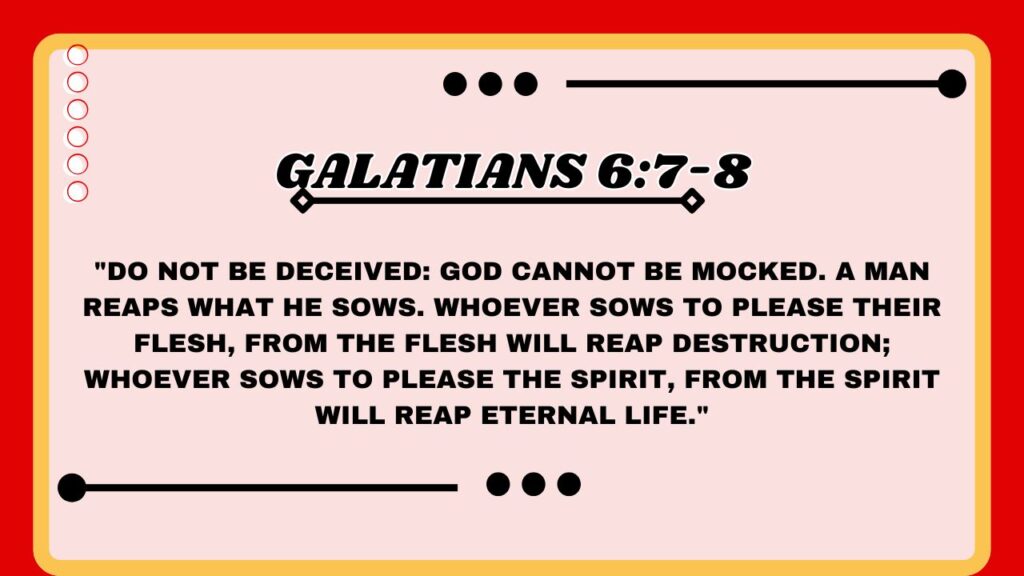
Paul explains the principle of spiritual consequences following naturally from choices. This metaphor reveals the connection between actions and outcomes. Evaluate your current “sowing” patterns and consider what harvest they will naturally produce.
Hosea 8:7a
“They sow the wind and reap the whirlwind.”
Hosea uses agricultural imagery to describe how Israel’s minor compromises led to major consequences. This poetic statement captures how sin often produces amplified effects. Notice areas where small compromises might be developing into larger problems in your life or community.
Proverbs 5:22
“The evil deeds of the wicked ensnare them; the cords of their sins hold them fast.”
Solomon describes sin as a trap that ensnares those who practice it. This verse portrays wickedness as self-imprisoning. Observe how destructive patterns tend to create their own bondage, and seek freedom through righteousness rather than deeper entanglement.
Jeremiah 2:19
“Your wickedness will punish you; your backsliding will rebuke you. Consider then and realize how evil and bitter it is for you when you forsake the Lord your God and have no awe of me,” declares the Lord, the Lord Almighty.
Jeremiah describes how Israel’s own sins became their punishment. This passage shows that rejection of God naturally leads to negative consequences. Recognize that many of sin’s worst effects are built into the action itself rather than externally imposed.
Numbers 32:23
“But if you fail to do this, you will be sinning against the Lord; and you may be sure that your sin will find you out.”
Moses warns the Israelites that hidden sin eventually becomes exposed. This verse emphasizes the inevitability of truth coming to light. Live with integrity in private matters, knowing that deception typically unravels over time.
Also Read: 51 Bible Verses About Butterflies
God’s Righteousness Displayed in Judgment
Psalm 9:7-8
“The Lord reigns forever; he has established his throne for judgment. He rules the world in righteousness and judges the peoples with equity.”
David celebrates God’s eternal reign characterized by righteous judgment. This passage connects God’s sovereignty with His perfect justice. Find reassurance in knowing that the ultimate authority in the universe is committed to fairness and righteousness.
Psalm 97:2-3
“Clouds and thick darkness surround him; righteousness and justice are the foundation of his throne. Fire goes before him and consumes his foes on every side.”
The psalmist depicts God’s holiness and the consuming nature of His judgment. This imagery emphasizes both the mystery and power of divine justice. Approach God with appropriate reverence, recognizing both His love and His holiness.
Isaiah 61:8
“For I, the Lord, love justice; I hate robbery and wrongdoing. In my faithfulness I will reward my people and make an everlasting covenant with them.”
Isaiah reveals God’s emotional response to justice and injustice. This verse connects God’s character with His actions toward both righteousness and wickedness. Align your own values with God’s by developing love for justice and hatred for wrongdoing.
Psalm 58:10-11
“The righteous will be glad when they are avenged, when they dip their feet in the blood of the wicked. Then people will say, ‘Surely the righteous still are rewarded; surely there is a God who judges the earth.'”
The psalmist describes the vindication felt when justice prevails against oppressors. This vivid imagery expresses relief at God’s intervention against evil. While avoiding personal vengeance, acknowledge the appropriate desire for justice when the vulnerable are harmed.
Deuteronomy 32:35
“It is mine to avenge; I will repay. In due time their foot will slip; their day of disaster is near and their doom rushes upon them.”
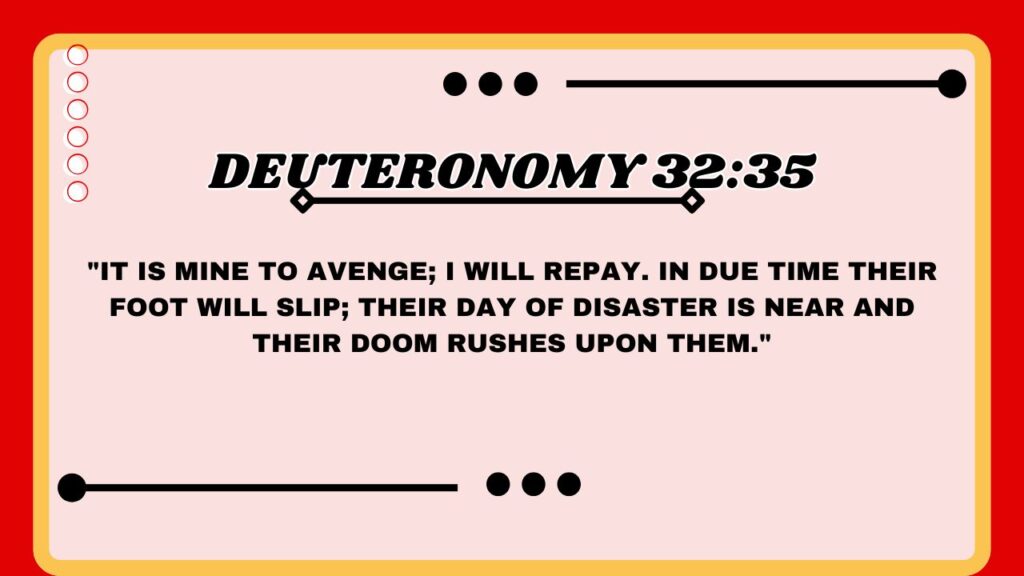
Moses records God’s declaration of His prerogative to execute judgment. This statement establishes divine authority over vengeance. Release the burden of settling scores yourself and trust God’s perfect timing and wisdom in addressing wrongs.
Also Read: 39 Important Bible Verses About Long Life
Warnings and Calls to Repentance
Ezekiel 18:30-32
“Therefore, you Israelites, I will judge each of you according to your own ways, declares the Sovereign Lord. Repent! Turn away from all your offenses; then sin will not be your downfall. Rid yourselves of all the offenses you have committed, and get a new heart and a new spirit. Why will you die, people of Israel? For I take no pleasure in the death of anyone, declares the Sovereign Lord. Repent and live!”
Ezekiel delivers God’s passionate appeal for Israel to change direction. This passage emphasizes individual accountability and God’s desire for life rather than death. Respond to conviction with genuine repentance rather than defensiveness or rationalization.
Isaiah 1:16-20
“Wash and make yourselves clean. Take your evil deeds out of my sight; stop doing wrong. Learn to do right; seek justice. Defend the oppressed. Take up the cause of the fatherless; plead the case of the widow. ‘Come now, let us settle the matter,’ says the Lord. ‘Though your sins are like scarlet, they shall be as white as snow; though they are red as crimson, they shall be like wool. If you are willing and obedient, you will eat the good things of the land; but if you resist and rebel, you will be devoured by the sword.’ For the mouth of the Lord has spoken.”
Isaiah invites Israel to reconciliation through concrete changes in behavior. This passage connects repentance with social justice and offers both promise and warning. Evaluate whether your repentance includes tangible actions, particularly in how you treat vulnerable members of society.
Joel 2:12-13
“‘Even now,’ declares the Lord, ‘return to me with all your heart, with fasting and weeping and mourning.’ Rend your heart and not your garments. Return to the Lord your God, for he is gracious and compassionate, slow to anger and abounding in love, and he relents from sending calamity.”
Joel emphasizes the importance of sincere internal repentance rather than external displays. This call reminds us of God’s readiness to show mercy to the genuinely penitent. Ensure your repentance involves genuine heart change rather than merely symbolic gestures.
Zephaniah 2:3
“Seek the Lord, all you humble of the land, you who do what he commands. Seek righteousness, seek humility; perhaps you will be sheltered on the day of the Lord’s anger.”
Zephaniah advises seeking God as protection from coming judgment. This verse offers practical guidance for those living in corrupt times. Cultivate humility and righteousness as your response to warnings about judgment, focusing on your own spiritual condition.
Amos 5:14-15
“Seek good, not evil, that you may live. Then the Lord God Almighty will be with you, just as you say he is. Hate evil, love good; maintain justice in the courts. Perhaps the Lord God Almighty will have mercy on the remnant of Joseph.”
Amos calls for active pursuit of goodness and justice as potential protection from judgment. This passage challenges empty religious claims without corresponding ethical behavior. Examine whether your profession of faith aligns with your practical commitment to goodness and justice.
Also Read: 37 Important Bible Verses About Discipline
The Hope of Divine Protection
Psalm 34:15-16
“The eyes of the Lord are on the righteous, and his ears are attentive to their cry; but the face of the Lord is against those who do evil, to blot out their name from the earth.”
David contrasts God’s responsiveness to the righteous with His opposition to evildoers. This psalm reveals the different experiences of those who honor or reject God. Find comfort in God’s attentiveness to your needs while maintaining awareness of His stance toward evil.
Psalm 91:7-8
“A thousand may fall at your side, ten thousand at your right hand, but it will not come near you. You will only observe with your eyes and see the punishment of the wicked.”
The psalmist describes divine protection amid widespread calamity. This passage promises preservation through judgment for those who trust God. Anchor your security in relationship with God rather than circumstances, knowing He can protect you even amid widespread trouble.
Proverbs 18:10
“The name of the Lord is a fortified tower; the righteous run to it and are safe.”
Solomon compares God’s name (representing His character) to a place of security. This proverb offers the image of God as reliable protection. When facing threats or witnessing judgment, make God your first resort rather than last resort.
Isaiah 3:10-11
“Tell the righteous it will be well with them, for they will enjoy the fruit of their deeds. Woe to the wicked! Disaster is upon them! They will be paid back for what their hands have done.”
Isaiah announces different outcomes for the righteous and wicked. This prophecy assures the faithful while warning wrongdoers. Remain steadfast in doing good even when immediate results aren’t visible, trusting God’s promise of eventual fruit.
Malachi 3:17-18
“‘On the day when I act,’ says the Lord Almighty, ‘they will be my treasured possession. I will spare them, just as a father has compassion and spares his son who serves him. And you will again see the distinction between the righteous and the wicked, between those who serve God and those who do not.'”
Malachi prophesies special treatment for the faithful when God acts in judgment. This promise portrays God’s fatherly care toward those who serve Him. Find courage in God’s commitment to distinguish between righteousness and wickedness, even when current circumstances blur the lines.
Conclusion: Bible Verses About the Wicked Being Punished
These passages reveal a consistent biblical theme: God takes wickedness seriously and will ultimately hold evildoers accountable. While His patience extends opportunity for repentance, justice remains certain for those who persist in rebellion.
Rather than fostering a spirit of vengeance, these verses should inspire humility and gratitude. All of us deserve judgment, yet God offers mercy through Christ to those who turn to Him. This understanding should motivate both personal righteousness and compassionate outreach to others.
God’s justice provides hope when evil seems to triumph. While we may not always see immediate consequences for wrongdoing, we can trust that God’s perfect judgment will eventually establish righteousness. Until then, we’re called to trust His timing, pursue justice ourselves, and extend the same grace to others that we’ve received.
Practical Application: Using These Verses
- Personal Reflection: Use these verses for self-examination rather than ammunition against others. Ask God to reveal any areas of wickedness in your own heart that need addressing.
- Prayer Guide: Incorporate these scriptures when praying about injustice. Rather than seeking revenge, pray for God’s perfect justice and the repentance of wrongdoers.
- Teaching Resource: Use these passages when explaining God’s character to others, being careful to balance His justice with His mercy.
- Comfort in Suffering: Share these verses with those experiencing injustice to remind them that God sees their situation and will ultimately address it.
- Evangelistic Tool: These scriptures can help explain the gospel’s urgency God’s justice demands accountability for sin, which Christ offers to bear on our behalf.
- Social Justice Framework: Let these passages inform your approach to addressing systemic wrongs, balancing righteous anger with recognition of God’s authority over vengeance.
- Parenting Wisdom: Use these verses to help children understand natural consequences and the importance of making right choices.
Frequently Asked Questions
Doesn’t focusing on God’s punishment contradict His love?
God’s justice and love work together perfectly. His desire is for all to repent and be saved (2 Peter 3:9), but love that lacks justice would ultimately fail to address evil. God’s punishment of wickedness demonstrates His love for victims and His commitment to ultimate goodness.
Why does God seem to delay punishment for evil?
Scripture explains God’s apparent delay as patience, giving opportunity for repentance (Romans 2:4). What seems like slowness to us operates within God’s eternal perspective, where a thousand years is like a day (2 Peter 3:8). This patience demonstrates mercy rather than indifference.
Does believing in divine punishment mean Christians shouldn’t seek justice now?
No Scripture repeatedly calls believers to “seek justice” and “defend the oppressed” (Isaiah 1:17). While recognizing God’s ultimate authority over vengeance, Christians should actively work for righteous systems and protection of the vulnerable in the present.
How can I reconcile these passages with Jesus’ teaching about loving enemies?
Jesus’ command to love enemies (Matthew 5:44) addresses our personal attitudes and actions, not God’s ultimate justice. We can genuinely desire good for wrongdoers (including repentance) while trusting God to address evil perfectly. Our love for enemies mirrors God’s patience, while His justice ensures evil won’t triumph forever.
What’s the difference between righteous concern for justice and vengeful attitudes?
Righteous concern focuses on upholding goodness and protecting the vulnerable, while vengeful attitudes center on personal satisfaction through another’s suffering. The former acknowledges God’s authority and seeks restoration where possible; the latter usurps God’s role and often seeks only punishment.
Read more knowledgeable blogs on Bible Aura

Piper McMillan is a passionate writer and educator dedicated to sharing the beauty and depth of the Bible. As the author behind the Piper McMillan website, she explores Bible verses, unlocks biblical narratives, and provides insights for living a Christ-centered life. Through warm, approachable, and inspiring articles, Piper guides readers to deepen their understanding of Scripture and apply its timeless wisdom to daily living. Her mission is to uplift, educate, and help others walk faithfully with God, rooted in His word.

